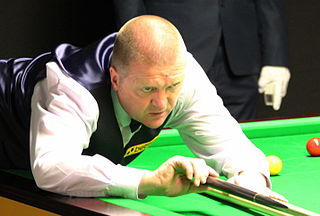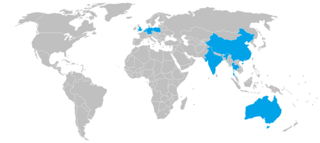
Snooker is a cue sport that was first played by British Army officers stationed in India in the second half of the 19th century. It is played on a rectangular table covered with a green cloth called baize, with six pockets: one at each corner and one in the middle of each long side. Using a cue stick, the individual players or teams take turns to strike the white cue ball to pot the other twenty-one snooker balls in the correct sequence, accumulating points for each pot. An individual frame of snooker is won by the player who has scored the most points. A snooker match ends with one of the players having won a predetermined number of frames.

John Stephen Parrott, is an English former professional snooker player and television personality. He was a familiar face on the professional snooker circuit during the late 1980s and throughout the 1990s, and remained within the top 16 of the world rankings for fourteen consecutive seasons.
The snooker world rankings are the official system of ranking professional snooker players to determine automatic qualification and seeding for tournaments on the World Snooker Tour. The ranking lists are maintained by the sport's governing body, the World Professional Billiards and Snooker Association. Each player's world ranking is based on their performances in designated ranking tournaments over the preceding two years. The world ranking list is updated after every ranking tournament. The system of world rankings was inaugurated in the 1976–77 season. Until the 2013–14 season, the point tariffs for each tournament were set by the governing body, but the rankings transitioned to a prize money list in the 2014–15 season.
The UK Championship is a professional ranking snooker tournament. It is one of snooker's prestigious Triple Crown events, along with the World Championship and the Masters. It is usually held at the Barbican Centre, York. Ronnie O'Sullivan has won the tournament a record seven times, followed by Steve Davis with six titles and Stephen Hendry with five. Neil Robertson is the reigning champion, winning his third title in 2020.

David Harold is an English former professional snooker player from Stoke-on-Trent. He was known by the nicknames of "the Hard Man" and "the Stoke Potter". He was also the first player on the television circuit to sport a plaster on his chin as a guide for his cue, which is a practice now adopted by Graeme Dott. As an amateur he played as David Harold, but after turning professional in 1991 he was registered as Dave Harold.

Rod Lawler is an English former professional snooker player. He is noted for his slow playing style, which gave rise to his nickname, "Rod the Plod".

Andrew Higginson is an English professional snooker player from Widnes, Cheshire. He is best known for being the surprise finalist of the 2007 Welsh Open.
Snooker world rankings 2010/2011: The professional world rankings for all the professional snooker players who qualified for the 2010/2011 season are listed below. The rankings worked as a two-year rolling list. The points for each tournament two years ago were removed, when the corresponding tournament during the current season has finished. The following table contains the rankings, which were used to determine the seedings for certain tournaments.

The 2010–11 snooker season was a series of snooker tournaments played between 20 May 2010 and 2 May 2011. The German Masters was the first ranking tournament in Germany since the 1997/1998 season. The Grand Prix was renamed to World Open, and the format of the tournament was change with 32 amateurs joining the Main Tour professionals. The Players Tour Championship minor-ranking series was introduced to the calendar. These events were open to amateurs and professional with a separate Order of Merit. The top 24 in the Order of Merit qualified to the Finals, which was a ranking event. The Premier League was for the first time part of the Main Tour. The Jiangsu Classic was renamed to the Wuxi Classic, and other events were introduced to the calendar: the new cue sport Power Snooker, the World Seniors Championship, and Snooker Shoot Out. The Scottish Professional Championship was held for the first time since 1989.
Snooker world rankings 2012/2013: The professional world rankings for all the professional snooker players who qualified for the 2012–13 season are listed below. The rankings worked as a two-year rolling list. The points for each tournament two years ago were removed, when the corresponding tournament during the current season has finished. The following table contains the rankings, which were used to determine the seedings for certain tournaments.

The 2013–14 snooker season was a series of snooker tournaments played between 6 June 2013 and 5 May 2014. From this season every qualifying match was held open to the public at various venues in the United Kingdom, replacing the World Snooker Academy in Sheffield. The number of wild-card players at the Chinese ranking events, except the Shanghai Masters, was reduced from eight to four and former Main Tour players were excluded. A professional player could not be selected for more than one wild-card match during the season.
Snooker world rankings 2013/2014: The professional world rankings for all the professional snooker players, who qualified for the 2013–14 season, are listed below. The rankings worked as a two-year rolling list. The points for each tournament two years ago were removed, when the corresponding tournament during the current season finished. The following table contains the rankings, which were used to determine the seedings for certain tournaments.
Snooker world rankings 2014/2015: The professional world rankings for all the professional snooker players, who qualified for the 2014–15 season, are listed below. The rankings work as a two-year rolling list. The points for each tournament two years ago are removed, when the corresponding tournament during the current season finishes. The following table contains the rankings, which were used to determine the seedings for certain tournaments.
The official 2018/2019 snooker world ranking points for the professional snooker players on the World Snooker Main Tour in the 2018–19 season are based on performances in ranking tournaments over a two-year rolling period. The rankings at the start of 2018/2019 season are determined by prize money earned in the 2016/2017 and 2017/2018 seasons and are updated after every tournament carrying ranking status; the players are re-ranked at the beginning of the current season after removing players relegated at the end of the previous season from the ranking list. As points are accrued from tournaments throughout the current season, the points from the corresponding tournaments from two seasons earlier are dropped. The rankings are used to set the official tournament seedings at various points throughout the season; even though the rankings are officially updated after every tournament carrying ranking status not all the rankings are used as seedings, and only the rankings officially used as seedings are documented below. The total points accumulated by the cut-off dates for the revised seedings are based on all the points up to that date in the 2018/2019 season, all of the points from the 2017/2018 season, and the points from the 2016/2017 season that have not yet been dropped.
Snooker world rankings 2018/2019: The professional world rankings for all the professional snooker players, who qualified for the 2018–19 season, are listed below. The rankings work as a two-year rolling list. The points for each tournament two years ago are removed when the corresponding tournament during the current season finishes. The following table contains the rankings which were used to determine the seedings for certain tournaments. Note that the list given below are just those rankings that are used for seeding tournaments. Other rankings are produced after each ranking event which are not noted here.

The sport of professional snooker has had a world ranking system in place since the 1976–77 season. Certain tournaments were given "ranking" status, with the results at those events contributing to a player's world ranking. Originally, the world rankings were decided based only on results in the World Snooker Championship, but other events were later added. The system used for the 2019–20 snooker season was first used in the 2010–11 season, where players won ranking points based entirely on prize money won from these events. The rankings are based on the prior two seasons, with ten revisions after specific tournaments throughout the season. These revisions are used as official rankings, with points awarded in the current season overwriting those from two years prior.
The official 2020/2021 snooker world ranking points for the professional snooker players on the World Snooker Main Tour in the 2020–21 season are based on performances in ranking tournaments over a two-year rolling period. The rankings at the start of 2020/2021 season are determined by prize money earned in the 2018/2019 and 2019/2020 seasons and are updated after every tournament carrying ranking status; the players are re-ranked at the beginning of the current season after removing players relegated at the end of the previous season from the ranking list. As points are accrued from tournaments throughout the current season, the points from the corresponding tournaments from two seasons earlier are dropped. The rankings are used to set the official tournament seedings at various points throughout the season; even though the rankings are officially updated after every tournament carrying ranking status not all the rankings are used as seedings, and only the rankings officially used as seedings are documented below. The total points accumulated by the cut-off dates for the revised seedings are based on all the points up to that date in the 2020/2021 season, all of the points from the 2019/2020 season, and the points from the 2018/2019 season that have not yet been dropped.
Snooker world rankings 2020/2021: The professional world rankings for all the professional snooker players, who qualified for the 2020–21 season, are listed below. The rankings work as a two-year rolling list. The points for each tournament two years ago are removed when the corresponding tournament during the current season finishes. The following table contains the rankings which were used to determine the seedings for certain tournaments. Note that the list given below are just those rankings that are used for seeding tournaments. Other rankings are produced after each ranking event which are not noted here.
The official 2021/2022 snooker world ranking points for the professional snooker players on the World Snooker Main Tour in the 2021–22 season are based on performances in ranking tournaments over a two-year rolling period. The rankings at the start of 2021/2022 season are determined by prize money earned in the 2019/2020 and 2020/2021 seasons and are updated after every tournament carrying ranking status; the players are re-ranked at the beginning of the current season after removing players relegated at the end of the previous season from the ranking list. As points are accrued from tournaments throughout the current season, the points from the corresponding tournaments from two seasons earlier are dropped. The rankings are used to set the official tournament seedings at various points throughout the season; even though the rankings are officially updated after every tournament carrying ranking status not all the rankings are used as seedings, and only the rankings officially used as seedings are documented below. The total points accumulated by the cut-off dates for the revised seedings are based on all the points up to that date in the 2021/2022 season, all of the points from the 2020/2021 season, and the points from the 2019/2020 season that have not yet been dropped.







